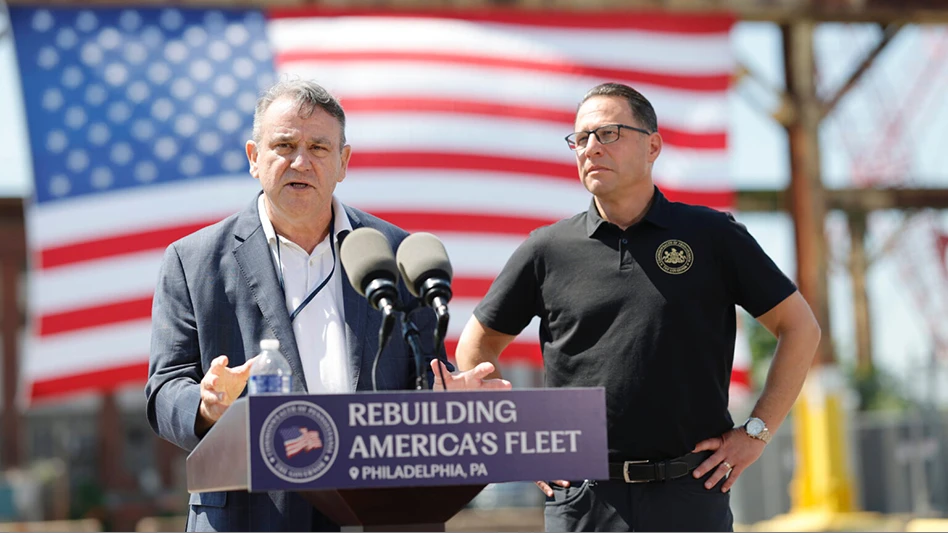
When Recycling Today hosted its State of the Scrap Recycling Industry Roundtable May 20, convening 10 scrap recycling executives, it was clear COVID-19, the disease caused by the novel coronavirus, and reactions to the pandemic were dominating the scrap industry landscape in North America.
The online roundtable discussion, which originally was scheduled to be an in-person event in late April in Las Vegas during the Institute of Scrap Recycling Industries (ISRI) Convention, was a two-hour conversation that touched on the challenges brought about by COVID-19 and the associated economic downturn, among several other issues.
The discussion began with the panelists offering their thoughts on the single greatest new challenge the pandemic has created for the scrap recycling sector.
Kevin Gershowitz, president of Gershow Recycling, Medford, New York, said that while his company’s employees have been paying attention to social distancing, “Our customers and peddlers, they need to be reminded every day.”
Gershow Recycling operates nine facilities throughout Long Island, New York, and employs more than 750 people.
The decline in volume was the biggest effect of the pandemic as of mid-May, he said, adding “it just doesn’t exist. Plus, in the shredding industry, we have a tendency to eat ourselves alive by trying to chase volume. Now, we are chasing volume that doesn’t exist—it’s just not out there.

“But, overall, I think we have been fortunate that we’ve been considered an essential business, so we at least have an opportunity to make something happen compared to so many other businesses that have no opportunities at all,” Gershowitz said.
Chad Olgin, co-president of Olgin + Efune, Phoenix, said his company has stepped up communication with its employees. “I’m sure everyone would say that communication is [vital] in any industry during any time; but, especially now, with so much misinformation, people don’t know what to do. They don’t know where to turn,” he said. “So, we have asked our management team at our locations to all be united in the way that we communicate with everybody and make sure that we are staying in front of everyone with all the changes that are happening in Arizona and anything federally that would affect our employees, as well. We are posting things around the property and reminding customers that we are following distancing rules here. Really good communication has been the best thing for us, and it’s helped our employees feel like they are being heard and protected.”
Formed in 2017, Olgin + Efune provides handling, processing and brokering of ferrous and nonferrous scrap and demolition services from a single location in Phoenix.
”I think resilience is probably the best word to describe the family business model.” – Becky Proler, president, Southern Core Recycling
Rick Dobkin, chief marketing officer for Shapiro Metals, headquartered in St. Louis, also mentioned the importance of communication. “We’ve got plants in six different states, and aligning our operations so that we are compliant in six different states is a bit of a challenge.”
Shapiro serves manufacturers across a broad range of industries and trades scrap metal globally. In addition to Missouri, the company has locations in Alabama, Georgia, Kansas, Tennessee and Texas.

Questions that were occupying the management team at Shapiro Metals included how they could supplement what looks to be a period of ongoing low volumes and preparing the company’s product offerings to go deeper into Shapiro Metals’ current customer base.
Joel Fogel, vice president of nonferrous at Middletown, Ohio-based Cohen, said, “I think one of the challenges is going to be understanding: What is the recovery going to look like? Kevin indicated flows, and we are all concerned about that. Volumes are off substantially, probably for everybody across the industry.
“So, one of the challenges coming out of this thing is understanding [and] matching labor with the volumes—both your purchase volumes and your sales volumes,” he added.
Cohen operates three facilities in Middletown and 17 additional facilities in Ohio and Kentucky. Established in 1924, Cohen provides ferrous and nonferrous scrap buying, processing and brokerage and auto parts inventory and sales and operates an auto shredder. Its affiliated company, Cobalt Recycling, provides electronics recycling, including collection, refurbishing, dismantling, shredding and hard drive destruction.
Matt Kripke, president of the brokerage firm Kripke Enterprises Inc. (KEI), headquartered in Toledo, Ohio, said, “We talk to recyclers all over North America, and I know that a lot of you who have retail operations, you shut down your retail for a while. So, one of the biggest effects has been that there was no painted siding in the aluminum world, and there were no UBCs (aluminum used beverage cans). So, those of us that take orders for an entire year in advance based on where our projected flows are, the scrap is not there to fulfill our commitments.”
KEI operates a second trading office in Florida and buys and sells nonferrous scrap, particularly aluminum. The company offers tolling services as well as hedging, trucking and storage. KEI also owns aluminum coil distributor Mid South Aluminum Inc., based in Jackson, Tennessee.

Kripke continued, “We have some consumers who are being very responsible about it, and we have some consumers saying, ‘I don’t really care what’s going on in the market, and I don’t care what’s going on in the world. We need our metal.’”
However, he said overall demand was not “all that great” as of mid-May, while “supply is so short.”
Becky Proler, president of Southern Core Recycling, Houston, said, “Speaking from Texas, which is oil country, we had two things happen to us. We had COVID and then we had the fall in oil prices. So, industrial account [volumes] are down here probably 60 percent, and they’re not looking like they’re going to come back quickly. A lot of the big oil service companies and oil producers involved in drilling, plus tubular products, things like that, their capital funds just got cut. So, we’re not looking at that coming back in the short term, and probably it’s going to take into a late quarter in 2021 to start seeing things coming back, unless the oil price jumps.”
Proler and her business partners founded Southern Core in 1989 and initially focused on automotive cores before evolving into a full-service scrap yard that specializes in cast and aluminum as well as all other types of ferrous and nonferrous materials. The company also operates an aluminum shredder.
”I think it’s really the next five years that will separate the good operators or the extraordinary operators from what I refer to as the rogue operators.” – Edward Kangeter, CEO, CASS Inc.
“I think it’s set as a new normal here in California,” said Edward Kangeter, CEO of CASS Inc., Oakland, California. “For example, Tesla, which is a large manufacturing facility locally, they were shut down and they [have about] 10,000 employees. We’re just under 200 employees, and I think the reason we were able to stay open during that entire period is we have done a really good job advocating on behalf of our industry, as well as our company, what the benefits of a company like this are.”
CASS processes ferrous, nonferrous and high-temp metals and manufactures secondary aluminum products.
He said the regulatory environment in Northern California is becoming more burdensome and the barrier to entering the scrap industry is “increasing dramatically.”
Kangeter added, “I think it’s really the next five years that will separate the good operators or the extraordinary operators from what I refer to as the rogue operators. And I think it’s going to completely change this industry, and I think it’s going to roll out from California across the nation.”
Many of the panelists were employed by or running family businesses, leading to a discussion about the health of the family business model within the recycling industry.

“There has been a lot of vertical integration by the steel mills, especially in our area [with the acquisition of] scrap companies,” Fogel said. “So, for us and for a lot of others, I think we have to think out of the box a little bit and see how we can vertically integrate within our own business. And we’ve done that through electronics or vertically integrated through some of the nonferrous stuff we are doing right now [such as investing in red metal scrap-to-copper cathode production facility]. It really depends on creativity and thinking out of the box a little bit. Doing things the way you were doing things 10 years ago, 15 years ago, 20 years ago does not really lend itself to growth.”
Gershowitz said he has found some challenges associated with the family business model but also advantages.
“The family business model for us makes things a little bit more difficult because, unlike the publicly traded firms or ones that might be family held but not operated by family, we don’t do layoffs,” he said. “I mean we cut overtime, but we don’t do layoffs. We take care of our people. We are paying everybody whether they’re testing positive or if they’re out because they are afraid to come to work. Everyone’s getting paid.

“We also have an advantage to some of those larger companies,” Gershowitz continued. “We’re able to get hold of PPP (the federal Paycheck Protection Program) money. We are more nimble. We can make decisions that maybe other larger firms can’t through their own corporate liabilities or responsibilities, such as we never stopped our [retail] trade.”
Dobkin said most family-owned scrap businesses are acquainted with the cyclical nature of the industry, which gives them an advantage. “I think where family-owned businesses can excel here is that we’ve seen this stuff before. We’ve got people who’ve been through numerous bad and down cycles, and so we have this sense of what you do when things get bad like this,” he said.
“Like Kevin said, we know the people who work for us, so we know our truck drivers. We know the guys working in the plants, and we know everybody in the office. And we like them; the decisions that we’re making aren’t strictly financial decisions, they are based on a team that we have built to take us into the future,” Dobkin continued. “So, we can kind of sit back and make some decisions that are important that aren’t strictly financial decisions.”
“I think resilience is probably the best word to describe the family business model,” Proler said. “It’s been resilient for over 100 years, and these third and fourth generations—I think somebody said it very well—we’ve seen everything. Family businesses know how to be flexible. They know how to operate in good times and bad times, and I think this is just part of the curve.”
Jacqueline Lotzkar, vice president of Pacific Metals Recycling International, Vancouver, British Columbia, also mentioned the nimbleness of the family business model. “I think family businesses have the ability to pivot and be agile.”
Pacific Metals is a fourth-generation, family-owned and operated recycling company that handles ferrous and nonferrous scrap as well as cardboard.
“I also think there’s an opportunity for the next generation to work outside the business [initially], and I think in many ways it’s best practice nowadays,” she said. “So, I think having the next generation go through these challenges and choosing to come back to the family business will make our industry stronger in the future.”

Explore the September 2020 State of the Industry Issue
Check out more from this issue and find your next story to read.
Latest from Recycling Today
- TerraSafe launches plastic-free products following merger with DisSolves
- University of Richmond wins first place in Campus Race to Zero Waste
- Sonoco achieves Pet Sustainability Coalition accreditation
- Eneos, Mitsubishi Chemical complete chemical recycling facility
- Clean Vision breaks ground on West Virginia pyrolysis facility
- Northeast Recycling LLC buys Mass Green Disposal Services LLC
- Otsego Refuse Center partners with NexTrex to tackle plastic waste
- Avient additives improve quality of recycled content




